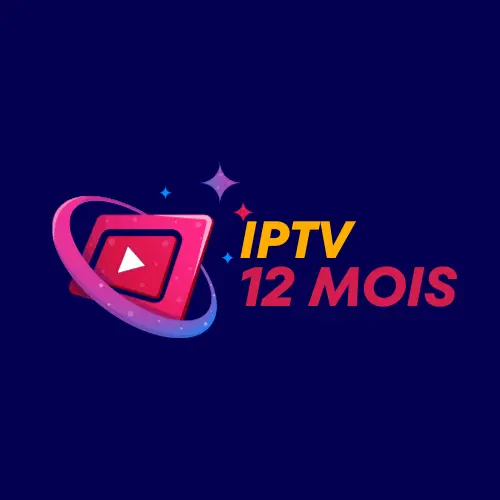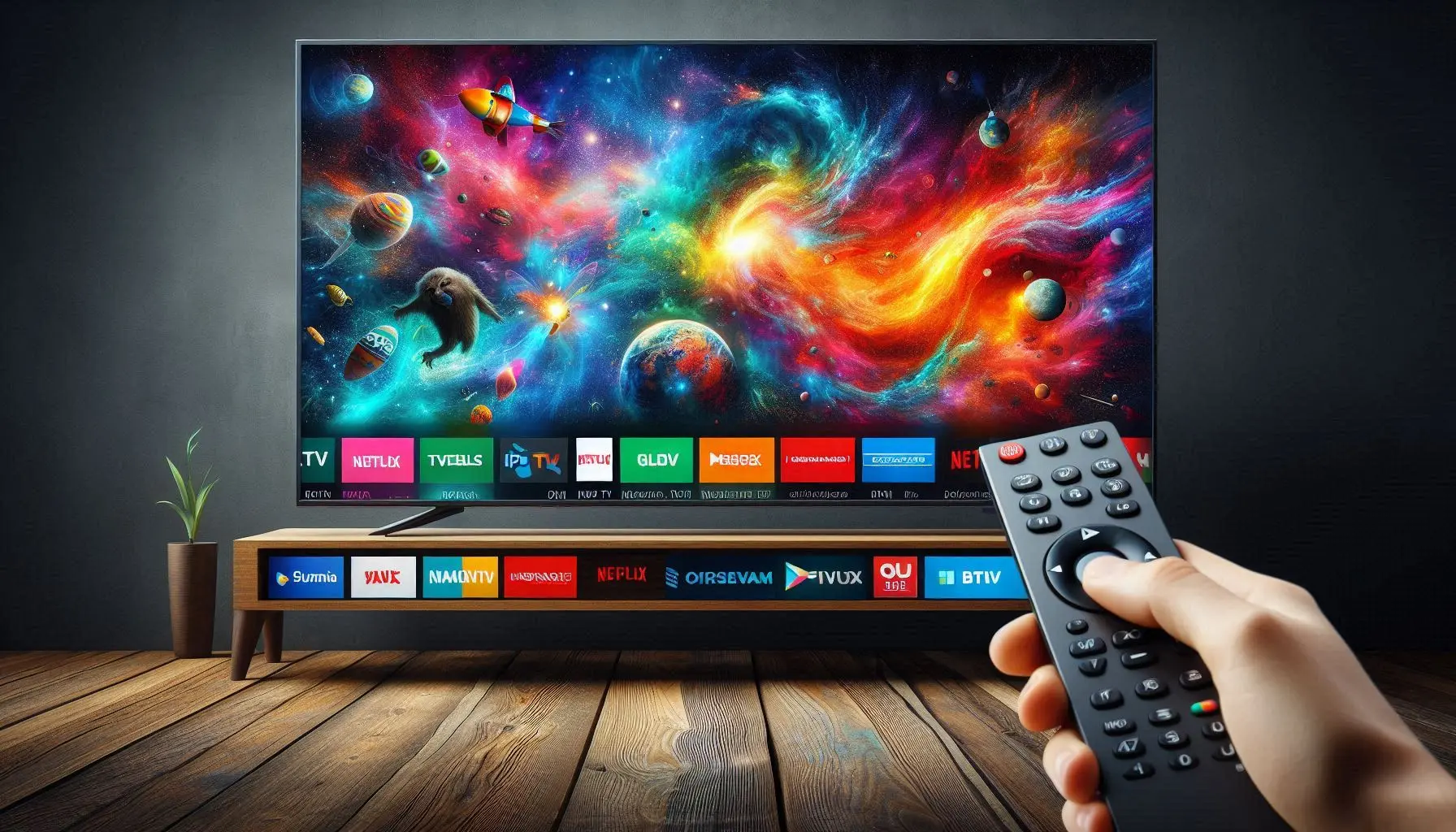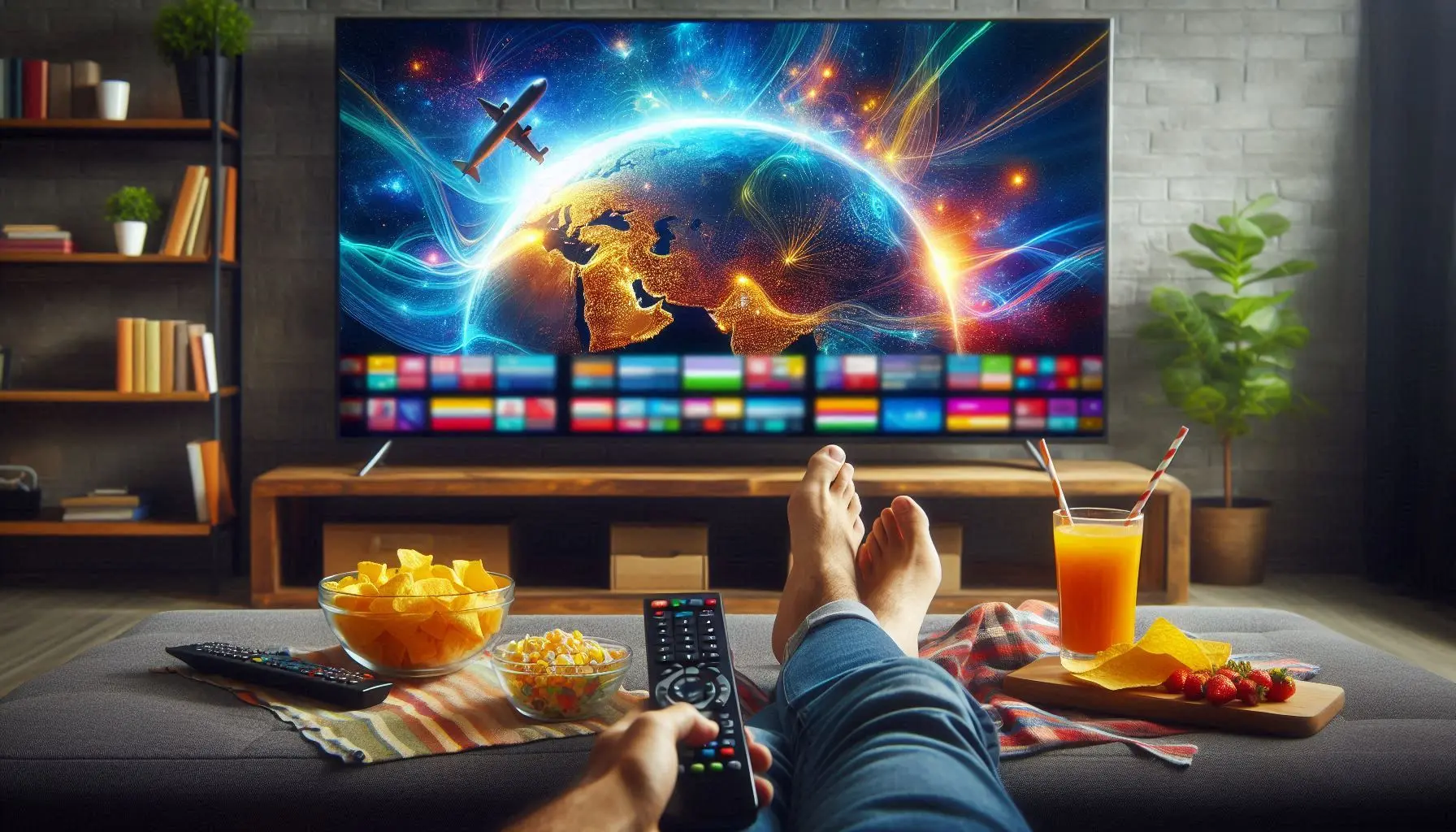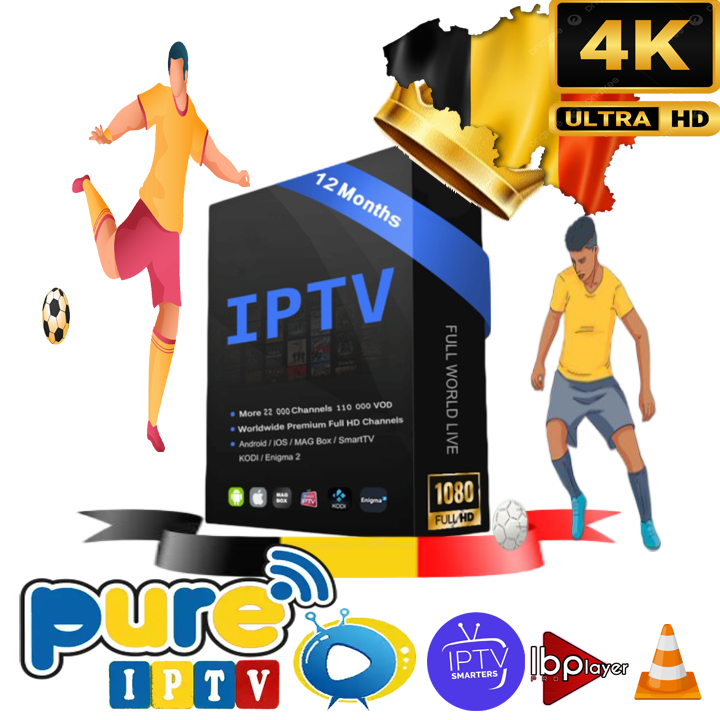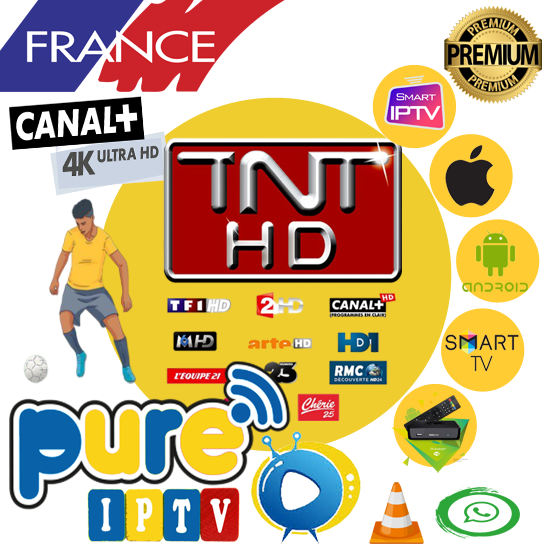Table of Contents
Introduction to IPTV and Smart TVs
IPTV, or Internet Protocol Television, is a method of delivering television programming through internet protocols, rather than traditional cable or satellite methods. This innovative technology allows users to access a wide range of audiovisual content via an internet connection, providing a more flexible viewing experience. Unlike conventional TV services, which rely on physical infrastructure and fixed programming schedules, IPTV offers on-demand content, live streaming capabilities, and a wider variety of channels. This transition from traditional methods to IPTV is driven by the increasing availability of high-speed internet and advancements in digital streaming technology.
Smart TVs play a pivotal role in the IPTV ecosystem, serving as an essential platform to access these services. A Smart TV is essentially a television set that integrates internet capabilities and features advanced computing functionality. Users can connect to the internet and download applications, allowing them to stream content from various sources, including IPTV providers. With built-in operating systems, Smart TVs can support numerous applications, enabling seamless access to IPTV channels, video-on-demand services, and other online content.
The integration of IPTV with Smart TVs enhances the viewing experience by offering greater convenience and control to users. Through an IPTV compatible Smart TV, viewers can browse a wide range of programming options, from movies and series to live sports and international channels. This convergence allows for an adaptable and customizable entertainment platform, catering to diverse viewing preferences. Furthermore, many Smart TVs come equipped with user-friendly interfaces and advanced search functionalities, making it easier for users to discover and access their preferred IPTV content.
Understanding IPTV Compatibility
The advent of Internet Protocol Television (IPTV) has transformed the way consumers access and enjoy television content. To successfully utilize IPTV, one essential aspect is ensuring that the television set is compatible with IPTV services. IPTV compatible smart TVs are equipped with the necessary technology to stream video content over the internet reliably. Understanding the factors that contribute to compatibility is crucial for consumers looking to enhance their viewing experience.
Firstly, supported formats play a vital role in defining an IPTV compatible smart TV. These televisions must be capable of decoding various codecs and formats such as H.264, MPEG-4, or HEVC, as these are commonly used by IPTV providers for delivering high-quality video streams. The ability to handle these formats ensures that users can enjoy a smoother and more enjoyable streaming experience.
Network requirements are another critical consideration. A stable and high-speed internet connection is fundamental for IPTV services to function properly. Generally, a bandwidth of at least 10 Mbps is recommended to facilitate uninterrupted streaming, especially for high-definition content. Therefore, consumers should assess their internet service and ensure it aligns with the demands of their IPTV compatible smart TV.
The availability of compatible software and applications is equally significant. Many IPTV services require specific apps for streaming, which may not be pre-installed on all smart TVs. Hence, consumers should verify that their devices support the necessary applications or consider options for side-loading them if required. Furthermore, regular software updates can enhance compatibility by providing users with the latest features and resolving potential issues.
When evaluating IPTV compatibility, consumers should also consider the overall performance, such as memory capacity, processing power, and connectivity options of the smart TV. Taking these criteria into account ensures a seamless experience when accessing IPTV services and improves overall satisfaction with the chosen device.
Top IPTV Compatible Smart TV Brands
When considering an IPTV compatible smart TV, several brands stand out in terms of functionality, user experience, and the range of supported IPTV applications. Samsung, LG, Sony, and others are leading players in the market, each offering distinct features that cater to IPTV users.
Starting with Samsung, this brand is renowned for its innovative technology and user-friendly interface. Their smart TVs typically come equipped with the Tizen OS, providing access to a wide array of IPTV apps, including popular options such as YouTube TV and Hulu Live. Users have consistently reported high satisfaction levels with the picture quality and overall performance of Samsung televisions, making them a solid choice for individuals seeking a reliable IPTV compatible smart TV.
LG, another strong contender, utilizes its webOS platform, which is also compatible with various top IPTV services. The intuitive interface allows easy navigation between apps, enhancing the user experience. LG smart TVs often include features like Dolby Vision and Dolby Atmos support, ensuring that viewers enjoy an immersive watching experience. Furthermore, LG’s aggressive pricing strategy makes its IPTV compatible models accessible for a variety of budgets.
Sony offers a premium line of smart TVs that excel in picture quality, largely due to their TRILUMINOS display technology. Sony’s Android TV platform supports an extensive selection of IPTV applications, catering to a diverse audience. Users appreciate the seamless integration of services like Netflix and Sling TV, helping to consolidate all entertainment options in one place. The brand is particularly well-suited for those who prioritize visual excellence in their IPTV viewing.
Other notable brands like TCL and Hisense are also gaining traction in the IPTV market. With competitive pricing and a growing catalog of supported apps, they offer excellent alternatives for budget-conscious consumers looking for IPTV compatible smart TVs.
Setting Up IPTV on a Smart TV
Setting up IPTV on a smart TV is a streamlined process that allows users to access a plethora of online streaming services. The first step involves ensuring your smart TV is internet-capable, either through a Wi-Fi connection or an Ethernet cable. Once your connection is established, you can begin to explore various IPTV services compatible with your device.
To proceed, navigate to your TV’s application store. Depending on the brand of the smart TV, this may vary. For instance, Samsung TVs utilize the Smart Hub, while LG TVs employ the LG Content Store. Here, you can search for IPTV applications. Popular choices include Perfect Player, IPTV Smarters, and Kodi. Download and install the selected application that suits your streaming preferences.
After installation, open the IPTV app, and you will typically be prompted to enter login credentials or an M3U playlist link. This link serves as a gateway to channel lists offered by various IPTV providers. If you do not have a subscription yet, research trusted IPTV service providers to obtain this link. Some users may prefer to download additional plugins or extensions to enhance functionality, which can usually be found in the app settings.
If you encounter any issues during setup or while streaming, a few troubleshooting measures can help. Ensure the internet connection is stable and verify that your IPTV link or credentials are correctly entered. Restarting the app or the smart TV itself can also resolve minor glitches. Additionally, clearing the app cache from the TV settings may enhance performance. Following these steps, you will be well on your way to enjoying a rich content experience on your IPTV compatible smart TV.
Benefits of Using IPTV on Smart TVs
The integration of IPTV technology with smart TVs has revolutionized the way viewers consume content. One of the primary advantages of utilizing IPTV on smart TVs is cost-effectiveness. Traditional cable subscriptions often come with high monthly fees and service commitments. In contrast, IPTV services often provide flexible pricing options, enabling users to select packages that align with their viewing preferences and budget. This shift toward more economical viewing options is appealing to many consumers, especially those seeking to reduce their entertainment expenses.
Another significant benefit of IPTV on smart TVs is the expanded range of channels available. IPTV services frequently offer numerous international and niche channels that are not part of standard cable packages, thereby enriching the viewing experience. For instance, a family interested in diverse cultures can seamlessly access foreign language channels, documentaries, or even specialized content related to their hobbies—a feature that is often limited in traditional TV sets.
Furthermore, the flexibility of viewing options afforded by IPTV on smart TVs cannot be overlooked. Users can watch live broadcasts, pause, and rewind shows, or even schedule recordings for future viewing. This functionality aligns perfectly with modern viewing habits, allowing personalized content access at any time. Additionally, IPTV services provide on-demand content libraries, enhancing the capability of IPTV compatible smart TVs to offer a vast selection of movies, series, and documentaries, which can be streamed at the user’s convenience.
Real-life examples illustrate the impact of IPTV on the viewing experience. For instance, a family that recently adopted an IPTV solution through their smart TV reported significant satisfaction due to the personalized content recommendations and the range of channels available compared to their previous cable subscription. As a result, the family’s overall entertainment experience has improved dramatically.
Potential Drawbacks of IPTV on Smart TVs
While IPTV on smart TVs offers numerous advantages, it is important to consider the potential drawbacks associated with this technology. One significant concern is the dependency on a stable internet connection. Unlike traditional cable services, which rely on established infrastructure, IPTV requires a continuous internet connection to deliver content. Any disruptions to the internet service, whether due to outages or fluctuations in bandwidth, can result in buffering, interruptions, or even loss of service, which can diminish the overall viewing experience.
Another notable limitation is related to bandwidth constraints. Many internet service providers (ISPs) impose data caps or throttling on users, which can adversely affect IPTV functionality. Streaming high-definition content typically requires substantial bandwidth; if a user exceeds their allocated data limit, they may encounter slow speeds or diminished picture quality. This can be particularly problematic for households with multiple users, where simultaneous streaming could easily lead to congestion and performance issues.
Furthermore, potential legal concerns surrounding certain IPTV services cannot be overlooked. Some IPTV providers operate in a legally ambiguous area, offering content without proper licensing or distribution rights. Subscribing to such services could expose users to legal ramifications, including fines or penalties. Additionally, the uncertainty of the legality of specific IPTV services can create anxiety among consumers who wish to enjoy their media content without fear of unintended violations.
Ultimately, while the prospect of utilizing an IPTV compatible smart TV presents many exciting opportunities, individuals must also consider these potential downsides. Weighing these factors carefully will enable users to make informed decisions regarding their entertainment options.
Exploring Free vs. Paid IPTV Services
The growing popularity of IPTV compatible smart TVs has led to an increased demand for various IPTV services. Users are often faced with the choice between free and paid IPTV options, each catering to different needs and preferences. Understanding the differences between these two types of services can significantly influence the viewing experience.
Free IPTV services typically offer a basic selection of channels without any associated costs. While this may seem appealing, these services often come with limitations. Users may encounter lower video quality, fewer channels available, and occasional buffering issues. Additionally, the customer support for these free platforms is usually minimal, leaving users to troubleshoot problems independently. As a result, the user experience may vary greatly, depending on the reliability of the service provider.
On the other hand, paid IPTV services specifically designed for IPTV compatible smart TVs tend to provide a more comprehensive experience. These services often boast a wider range of channels, including premium content and international programming. Moreover, the picture and sound quality is generally superior, enhancing overall viewer satisfaction. Paid IPTV providers also typically offer better customer support, which can be pivotal for troubleshooting and ongoing service quality. Subscriptions often come with additional features, such as DVR capabilities, catch-up TV, and a user-friendly interface, which together can greatly improve the user experience.
When making a decision between free and paid IPTV services, it is essential for users to consider their viewing habits, budget, and the value they place on quality and support. For those who prioritize a rich viewing experience with reliable service, paid IPTV options may be the more suitable choice. Conversely, users who are willing to sacrifice some quality and support for free access may still find suitable options. Understanding these dynamics can guide buyers towards IPTV compatible smart TV services that best meet their needs.
Future Trends in IPTV and Smart TV Technology
The landscape of IPTV and smart TVs is rapidly evolving, driven by advancements in technology and changing consumer preferences. As more households adopt these technologies, several future trends are emerging that will significantly enhance viewing experiences. One notable advancement is the ongoing enhancement of streaming technology, which is expected to provide smoother, faster, and more reliable content delivery. Improved codecs and bandwidth efficiency will enable higher quality streams and reduce buffering, enhancing the overall experience for viewers.
Another significant trend is the rise of 8K content. As 8K TVs become more affordable and widely accessible, content creators are beginning to produce media that takes advantage of this ultra-high definition resolution. The growth of 8K IPTV compatible smart TVs is anticipated to push more broadcasters and streaming services to invest in this technology, offering audiences an incredibly immersive viewing experience. With a much higher pixel density than 4K, 8K content allows viewers to enjoy sharp, detailed images, making it a compelling option for film enthusiasts.
Furthermore, Artificial Intelligence (AI) is playing an increasingly central role in shaping the future of IPTV and smart TVs. By utilizing AI algorithms, these devices can learn user preferences and recommend content tailored to individual tastes. This personalization can help viewers discover new shows and movies that align with their interests, creating a more engaging and satisfying viewing experience. AI-powered features may also include voice recognition and smart assistants that allow for more intuitive navigation through content.
These advancements signal a transformative time for IPTV compatible smart TVs, with consumers poised to experience richer, more dynamic entertainment options. The integration of enhanced streaming technologies, the emergence of 8K content, and the implementation of AI promise to significantly improve how audiences interact with their viewing devices in the coming years. As we move forward, expectations for IPTV and smart TV capabilities will undoubtedly continue to expand.
Conclusion: Embracing the IPTV Revolution with Smart TVs
As the landscape of digital entertainment continues to evolve, IPTV compatible smart TVs are increasingly becoming central to how we access and enjoy content. Throughout this guide, we have explored various facets related to IPTV technology, including how it works, its advantages over traditional broadcasting, and its seamless integration with modern Smart TVs. Understanding IPTV compatibility with smart TVs is crucial for consumers looking to take full advantage of the convenience and flexibility that this technology offers.
The shift towards IPTV represents a significant change in our viewing habits. Unlike traditional cable or satellite options, IPTV allows users to stream content directly over the internet, often with a vast selection of channels and on-demand options available at their fingertips. This versatility not only caters to the diverse preferences of today’s viewers but also reflects a broader trend towards personalized, user-centric experiences in digital media.
Moreover, the role of smart TVs in enabling this transition cannot be overstated. Devices designed with IPTV compatibility in mind empower users to easily access and manage their content, making the transition to IPTV smoother and more intuitive. As more households adopt IPTV services, the demand for smart TVs that support these systems is expected to grow, solidifying their place as essential entertainment devices.
In conclusion, embracing the IPTV revolution through the adoption of IPTV compatible smart TVs is a logical step toward enhancing the viewing experience. By staying informed about the technological advancements and making careful selections when upgrading entertainment systems, consumers can enjoy a future filled with more engaging and varied content delivery. This commitment to understanding and utilizing IPTV technology will undoubtedly transform how we engage with media for years to come.
